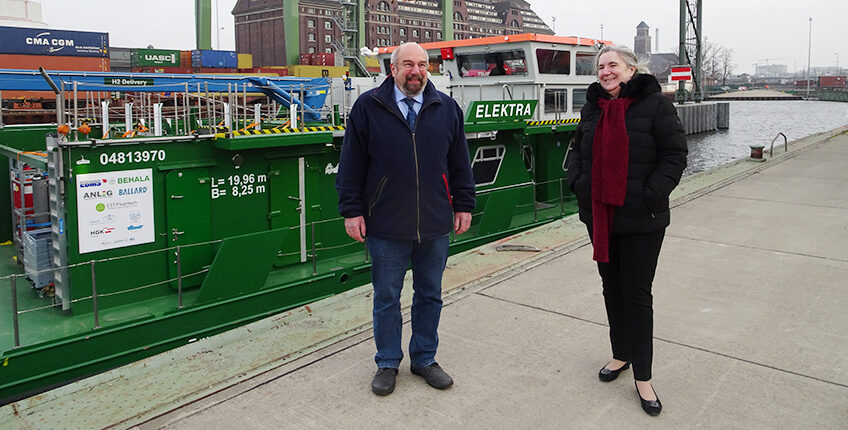After almost two years of construction at the Hermann Barthel GmbH shipyard in Derben, Germany, and a three-day transfer to Berlin's Westhafen, the testing of this unique, innovative and zero-emission push boat can now begin.
Unter der Projektleitung des Fachgebietes Entwurf und Betrieb Maritimer Systeme der TU Berlin sind die Unternehmen BEHALA – Berliner Hafen- und Lagerhausgesellschaft (Logistik), Schiffswerft Hermann Barthel , BALLARD Power Systems (Brennstoffzellen), ARGO – ANLEG (Wasserstoffsystem), Schiffselektronik Rostock (elektr. Energiesystem), EST-Floattech (Batteriesystem) und HGK Shipping (nautischer Betrieb) an der Entwicklung und am Bau und der Erprobung der ELEKTRA als Partner beteiligt.
The ELEKTRA will take on a showcase function as the first emission-free ship. The energy system is designed in such a way that it can be transferred to a wide range of inland waterways and coastal vessel types.
It is not just a matter of providing energy for the ship’s propulsion system. Although the push boat has its main purpose in pushing barges, at the same time the crew also lives and works on board. This means that in addition to the main propulsion system, energy must also be provided for maintaining the temperature in the rooms and in the wheelhouse, the crew also cooks and washes on board and the batteries also require “comfortable temperature levels” for their efficient operation and a long service life.
All this must work with a limited amount of energy being carried onboard and without sacrificing range.
The waste heat from the fuel cells is harnessed through the use of a water cooling system and the rooms are heated via a water-water heat pump; the advantage here is that the ship always has water available under its keel at temperature levels of more than 0° C.
The use of a proprietary energy management system and a driving assistant support the skipper and logistician in planning the operations and in carrying out the consignment of goods.
With 750 kg of usable gaseous hydrogen at a pressure of 500 bar on board and a battery capacity of 2,500 kilowatt hours, the ship has a range of approx. 400 kilometres in pushed convoy with the URSUS heavy-lift lighter (barge). This means that on the shipping routes from Berlin in the direction of Rhine/Ruhr, Hamburg and Szczecin, only one further shore station is needed in each direction, in addition to the Westhafen, to supply the ELEKTRA with the necessary hydrogen and electricity.
The first shore-side stations for the hydrogen tanks and the charging current in the required power class of 500 kilowatts will be commissioned in both Berlin’s Westhafen and the port of Lüneburg, in 2023.
The EBMS department of the TU Berlin has concluded a supply contract with Industrie- und Gewerbepark Mittelelbe / H2 Green Power & Logistics GmbH for filling and transporting the tank systems (Multiple Energy Gas Container – MEGC) with green hydrogen until the end of the project term at the end of 2024.
The MEGCs can be exchanged with the ship’s own crane and the power connection is made via a charging boom from which the cables are routed on shore.
For the ship’s crew, handling the arm-thick cables is thus very easy and the ship is connected to the charging station in a short amount of time while the pier remains free of cables. The trials will initially take place mainly in the area of the capital region, and from 2023 onwards the trials will then be continued increasingly in long-distance traffic in the direction of Hamburg.
What is now ahead is the nautical certification by the inspection commission with voyages in different pushed convoy configurations on the Havel in Berlin, and we then look forward to continuing with the trial phases in the project.
At the end of the project, our team will have learned a lot and we will then be able to say how future marketable ships in this performance class must be optimally equipped and what the concepts for other types of ships and performance classes might look like.
With a total project volume of approx. 13 million euros, the project is funded by the Federal Ministry of Transport and Digital Infrastructure (BMVI – Bundesministerium für Verkehr und digitale Infrastruktur) with approx. 8 million euros and supervised and coordinated by the Project Management Organisation Jülich (PTJ) and the National Organisation Hydrogen and Fuel Cell Technology (NOW).
BEHALA – Berliner Hafen- und Lagerhausgesellschaft mbH
www.behala.de
A video about the construction ELEKTRA can be found at: www.vimeo.com/567047890/f8ebb00791
Photo: Petra Cardinal and Klaus-G. Lichtfuß are thrilled with the arrival of the Elektra in the Westhafen.


